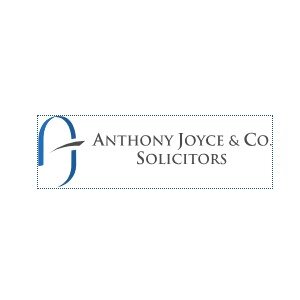Best Bankruptcy Lawyers in Dublin
Share your needs with us, get contacted by law firms.
Free. Takes 2 min.
List of the best lawyers in Dublin, Ireland
About Bankruptcy Law in Dublin, Ireland
Bankruptcy in Dublin, Ireland is a legal process that provides a way for individuals who are unable to pay their debts to resolve their financial difficulties. The process involves the individual being declared bankrupt by the High Court and their assets being used to pay off their debts. Once declared bankrupt, the debtor's financial affairs are placed in the hands of the Official Assignee, who is responsible for managing the bankruptcy process.
Why You May Need a Lawyer
Bankruptcy can be a complex and stressful process. A lawyer specializing in bankruptcy law can provide valuable assistance in the following situations:
- Navigating the legal intricacies and requirements of the bankruptcy process. - Representing you in court and dealing with the Official Assignee. - Protecting your rights and ensuring fair treatment by creditors. - Helping you understand the implications of bankruptcy on your future finances and credit. - Advising on alternatives to bankruptcy, such as Debt Settlement Arrangements (DSA) or Personal Insolvency Arrangements (PIA).
Local Laws Overview
The key aspects of bankruptcy law in Dublin, Ireland include:
- The minimum debt threshold for bankruptcy is €20,000. - Bankruptcy is typically discharged after one year, although it can be extended in certain cases. - The process is initiated by filing a petition with the High Court. - The Official Assignee manages the bankrupt’s estate, liquidating assets to repay creditors. - Certain assets are exempt from sale, including essential household items, tools of trade, and a portion of your income. - Following discharge, debts that were included in the bankruptcy are written off, although some debts like family maintenance or court fines are not discharged.
Frequently Asked Questions
What is the minimum amount of debt required to apply for bankruptcy in Dublin?
In Dublin, the minimum amount of debt required to apply for bankruptcy is €20,000.
How long does the bankruptcy process take?
The bankruptcy process typically lasts for one year, though it can be extended if the debtor fails to comply with their obligations.
Can I keep my home if I declare bankruptcy?
Whether you can keep your home depends on various factors, including the equity in your property and your income. The Official Assignee will review your situation and make a decision.
What happens to my debts once I am declared bankrupt?
Once you are declared bankrupt, most of your debts are written off. However, certain types of debt, such as child support and court fines, are not discharged.
Will bankruptcy affect my spouse or partner?
Bankruptcy applies only to the individual declared bankrupt. However, if you have joint debts with your spouse or partner, they may still be liable for the full amount of those debts.
What assets are protected in bankruptcy?
Essential household items, tools of trade, and a portion of your income are typically protected and not subject to sale during the bankruptcy process.
Can I travel abroad while bankrupt?
Yes, you can travel abroad while you are bankrupt. However, you must inform the Official Assignee of your travel plans.
How will bankruptcy affect my credit rating?
Bankruptcy will negatively affect your credit rating and will appear on your credit report for up to 12 years.
Can I be forced into bankruptcy by my creditors?
Yes, creditors can petition the court to have you declared bankrupt if you owe them €20,000 or more.
Are there alternatives to bankruptcy?
Yes, alternatives to bankruptcy include Debt Settlement Arrangements (DSA) and Personal Insolvency Arrangements (PIA). These options should be discussed with a financial advisor or insolvency practitioner.
Additional Resources
For further information and assistance, consider the following resources:
- The Insolvency Service of Ireland (ISI) - Citizen’s Information Service - Money Advice & Budgeting Service (MABS) - Legal Aid Board
Next Steps
If you are considering bankruptcy, it is important to seek professional legal advice. Here is how to proceed:
- Schedule a consultation with a solicitor who specializes in bankruptcy law. - Prepare all relevant financial documents for your consultation. - Discuss your situation in detail with your solicitor to understand your options. - Follow the legal advice provided and work closely with your solicitor throughout the process.
Lawzana helps you find the best lawyers and law firms in Dublin through a curated and pre-screened list of qualified legal professionals. Our platform offers rankings and detailed profiles of attorneys and law firms, allowing you to compare based on practice areas, including Bankruptcy, experience, and client feedback.
Each profile includes a description of the firm's areas of practice, client reviews, team members and partners, year of establishment, spoken languages, office locations, contact information, social media presence, and any published articles or resources. Most firms on our platform speak English and are experienced in both local and international legal matters.
Get a quote from top-rated law firms in Dublin, Ireland — quickly, securely, and without unnecessary hassle.
Disclaimer:
The information provided on this page is for general informational purposes only and does not constitute legal advice. While we strive to ensure the accuracy and relevance of the content, legal information may change over time, and interpretations of the law can vary. You should always consult with a qualified legal professional for advice specific to your situation.
We disclaim all liability for actions taken or not taken based on the content of this page. If you believe any information is incorrect or outdated, please contact us, and we will review and update it where appropriate.











